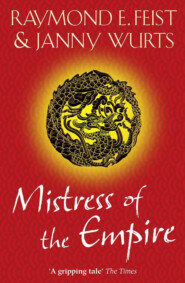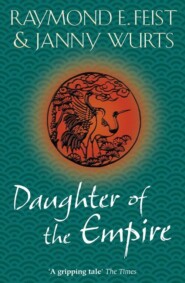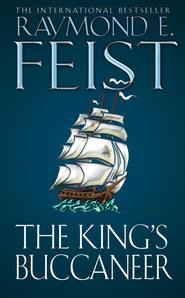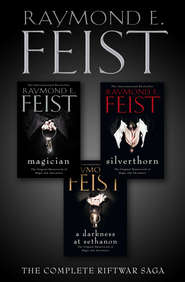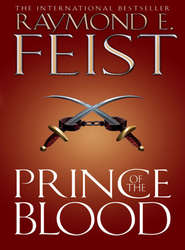По всем вопросам обращайтесь на: info@litportal.ru
(©) 2003-2025.
✖
The Riftwar Saga Series Books 2 and 3: Silverthorn, A Darkness at Sethanon
Автор
Год написания книги
2018
Настройки чтения
Размер шрифта
Высота строк
Поля
After all his court was in attendance, the Duke spoke. ‘Yesterday was the last day of the eleventh year of the reign of our Lord King, Rodric the Fourth. Today is the Festival of Banapis. The following day will find these boys gathered here counted among the men of Crydee, boys no longer, but apprentices and freemen. At this time it is proper for me to inquire if any among you wishes to be released from service to the Duchy. Are there any among you who so wish?’ The question was formal in nature and no response was expected, for few ever wished to leave Crydee. But one boy did step forward.
The herald asked, ‘Who seeks release of his service?’
The boy looked down, clearly nervous. Clearing his throat, he said, ‘I am Robert, son of Hugen.’ Pug knew him, but not well. He was a netmender’s son, a town boy, and they rarely mixed with the keep boys. Pug had played with him upon a few occasions and had a sense the lad was well regarded. It was a rare thing to refuse service, and Pug was as curious as any to hear the reasons.
The Duke spoke kindly. ‘What is your purpose, Robert, son of Hugen?’
‘Your grace, my father is unable to take me into his craft, for my four brothers are well able to ascend to the craft as journeymen and masters after him, as are many other netmender’s sons. My eldest brother is now married and has a son of his own, so my family no longer has room for me in the house. If I may not stay with my family and practice my father’s craft, I beg your grace’s leave to take service as a sailor.’
The Duke considered the matter. Robert was not the first village boy to be called by the lure of the sea. ‘Have you found a master willing to take you into his company?’
‘Yes, Your Grace. Captain Gregson, master of the ship Green Deep from Margrave’s Port is willing.’
‘I know this man,’ said the Duke. Smiling slightly he said, ‘He is a good and fair man. I recommend you into his service and wish you well in your travels. You will be welcomed at Crydee whenever you return with your ship.’
Robert bowed, a little stiffly, and left the courtyard, his part in the Choosing done. Pug wondered at Robert’s adventuresome choice. In less than a minute the boy had renounced his ties with his family and home and was now a citizen of a city he had never seen. It was custom that a sailor was considered to owe his loyalty to the city that was his ship’s home port. Margrave’s Port was one of the Free Cities of Natal, on the Bitter Sea, and was now Robert’s home.
The Duke indicated the herald should continue.
The herald announced the first of the Craftmasters, Sailmaker Holm, who called the names of three boys. All three took service, and none seemed displeased. The Choosing went smoothly, as no boy refused service. Each boy went to stand next to his new master.
As the afternoon wore on and the number of boys diminished, Pug became more and more uncomfortable. Soon there were only two boys besides Pug and Tomas standing in the center of the court. All the Craftmasters had called their apprentices, and only two of the Duke’s household staff beside the Swordmaster had not been heard from. Pug studied the group on the top of the steps, his heart pounding with anxiety. The two Princes regarded the boys, Lyam with a friendly smile, Arutha brooding on some thought or another. The Princess Carline was bored by the entire affair and took little pains to hide the fact, as she was whispering to Roland. This brought a disapproving look from Lady Marna, her governess.
Horsemaster Algon came forth, his brown-and-golden tabard bearing a small horsehead embroidered over his left breast. The Horsemaster called the name of Rulf, son of Dick, and the stocky son of the Duke’s stableman walked over to stand behind the master. When he turned, he smiled condescendingly at Pug. The two boys had never gotten along, the pock-scarred boy spending many hours taunting and tormenting Pug. While they both worked in the stable under Dick, the stableman had looked the other way whenever his son sprang a trap on Pug, and the orphan was always held responsible for any difficulty that arose. It had been a terrible period for Pug, and the boy had vowed to refuse service rather than face the prospect of working next to Rulf the rest of his life.
Housecarl Samuel called the other boy, Geoffry, who would become a member of the castle’s serving staff, leaving Pug and Tomas standing alone. Swordmaster Fannon then stepped forward, and Pug felt his heart stand still as the old soldier called, ‘Tomas, son of Megar.’
There was a pause, and Pug waited to hear his own name called, but Fannon stepped back and Tomas crossed over to stand alongside him. Pug felt dwarfed by the gaze of all upon him. The courtyard was now larger than he had ever remembered it, and he felt ill fashioned and poorly dressed. His heart sank in his chest as he realized that there was no Craftmaster or staff member present who had not taken an apprentice. He would be the only boy uncalled. Fighting back tears, he waited for the Duke to dismiss the company.
As the Duke started to speak, sympathy for the boy showing clearly in his face, he was interrupted by another voice. ‘Your Grace, if you would be so kind.’
All eyes turned to see Kulgan the magician step forward. ‘I have need of an apprentice and would call Pug, orphan of the keep, to service.’
A wave of murmuring swept through the assembled Craftmasters. A few voices could be heard saying it wasn’t proper for a magician to participate in the Choosing. The Duke silenced them with a sweep of his gaze, his face stern. No Craftmaster would challenge the Duke of Crydee, the third-ranking noble in the Kingdom, over the standing of one boy. Slowly all eyes returned to regard the boy.
The Duke said, ‘As Kulgan is a recognized master of his craft, it is his right to choose. Pug, orphan of the keep, will you take service?’ Pug stood rigid. He had imagined himself leading the King’s army into battle as a Knight-Lieutenant, or discovering someday he was the lost son of nobility. In his boyish imaginings he had sailed ships, hunted great monsters, and saved the nation. In quieter moments of reflection he had wondered if he would spend his life building ships, making pottery, or learning the trader’s skill, and speculated on how well he would do in each of those crafts. But the one thing he never thought of, the one dream that had never captured his fantasies, was that of becoming a magician.
He snapped out of his shocked state, aware the Duke patiently awaited his response. He looked at the faces of those before him. Father Tully gave him one of his rare smiles, as did Prince Arutha. Prince Lyam nodded a slight yes, and Kulgan regarded him intently. There were signs of worry upon the magician’s face, and suddenly Pug decided. It might not be an entirely proper calling, but any craft was better than none. He stepped forward and caught his own heel with his other foot, and landed face down in the dust. Picking himself up, he half scrambled, half ran to the magician’s side. The misstep broke the tension, and the Duke’s booming laughter filled the courtyard. Flushing with embarrassment, Pug stood behind Kulgan. He looked around the broad girth of his new master and found the Duke watching, his expression tempered by a kind nod at the blushing Pug. The Duke turned back to those who stood waiting for the Choosing to end.
‘I declare that each boy present is now the charge of his master, to obey him in all matters within the laws of the Kingdom, and each shall be judged a true and proper man of Crydee. Let the apprentices attend their masters. Until the feasting, I bid you all good day.’ He turned and presented his left arm to his daughter. She placed her hand lightly upon it and they passed into the keep between the ranks of the courtiers, who drew aside. The two Princes followed, and the others of the court. Pug saw Tomas leave in the direction of the guard barracks, behind Master Fannon.
He turned his attention back to Kulgan, who was standing lost in thought. After a moment the magician said, ‘I trust neither of us has made a mistake this day.’
‘Sir?’ Pug asked, not understanding the magician’s meaning. Kulgan waved one hand absently, causing his pale yellow robe to move like waves rippling over the sea. ‘It is no matter, boy. What’s done is done. Let us make the best of things.’
He placed his hand on the boy’s shoulder. ‘Come, let us retire to the tower where I reside. There is a small room below my own that should do for you. I had intended it for some project or another, but have never managed to find the time to prepare it.’
Pug stood in awe. ‘A room of my own?’ Such a thing for an apprentice was unheard of. Most apprentices slept in the workrooms of their master, or protected herds, or the like. Only when an apprentice became a journeyman was it usual for him to take private quarters.
Kulgan arched one bushy eyebrow. ‘Of course. Can’t have you underfoot all the time. I would never get anything done. Besides, magic requires solitude for contemplation. You will need to be untroubled as much as or perhaps more than I will.’ He took out his long, thin pipe from a fold of his robe and started to stuff it full of tabac from a pouch that had also come from within the robe.
‘Let’s not bother with too much discussion of duties and such, boy. For in truth, I am not prepared for you. But in short order I will have things well in hand. Until then we can use the time by becoming acquainted with one another. Agreed?’ Pug was startled. He had little notion of what a magician was about, in spite of the night spent with Kulgan weeks ago, but he readily knew what Craftmasters were like, and none would have thought to inquire whether or not an apprentice agreed with his plans. Not knowing what to say, Pug just nodded.
‘Good, then,’ said Kulgan, ‘let us be off to the tower to find you some new clothes, and then we will spend the balance of the day feasting. Later there will be ample time to learn how to be master and apprentice.’ With a smile for the boy, the stout magician turned Pug around and led him away.
The late afternoon was clear and bright, with a gentle breeze from the sea cooling the summer heat. Throughout the keep of Castle Crydee, and the town below, preparations for the Festival of Banapis were in progress.
Banapis was the oldest known holiday, its origins lost in antiquity. It was held each Midsummer’s Day, a day belonging to neither the past nor the coming year. Banapis, known by other names in other nations, was celebrated over the entire world of Midkemia according to legend. It was believed by some that the festival was borrowed from the elves and dwarves, for the long-lived races were said to have celebrated the feast of Midsummer as far back as the memory of both races could recall. Most authorities disputed this allegation, citing no reason other than the unlikelihood of humans borrowing anything from the elven or dwarven folk. It was rumored that even the denizens of the Northlands, the goblin tribes and the clans of the Brotherhood of the Dark Path, celebrated Banapis, though no one had ever reported seeing such a celebration.
The courtyard was busy. Huge tables had been erected to hold the myriad varieties of foods that had been in preparation for over a week. Giant barrels of dwarven ale, imported from Stone Mountain, had been hauled out of the cellars and were resting on protesting, overburdened wood frames. The workmen, alarmed at the fragile appearance of the barrel ricks, were quickly emptying some of the contents. Megar came out of the kitchen and angrily shooed them away. ‘Leave off, there will be none left for the evening meal at this rate! Back to the kitchen, dolts! There is much work to be done yet.’
The workers went off, grumbling, and Megar filled a tankard to ensure the ale was at proper temperature. After he drained it dry and satisfied himself that all was as it should be, he returned to the kitchen.
There was no formal beginning to the feast. Traditionally, people and food, wine and ale, all accumulated until they reached a certain density, then all at once the festivities would be in full swing.
Pug ran from the kitchen. His room in the northmost tower, the magician’s tower as it had become known, provided him with a shortcut through the kitchen, which he used rather than the main doors of the keep. He beamed as he sped across the courtyard in his new tunic and trousers. He had never worn such finery and was in a hurry to show his friend Tomas.
He found Tomas leaving the soldiers’ commons, nearly as much in a hurry as Pug. When the two met, they both spoke at once.
‘Look at the new tunic—’ said Pug.
‘Look at my soldier’s tabard—’ said Tomas.
Both stopped and broke into laughter.
Tomas regained his composure first. ‘Those are very fine clothes, Pug,’ he said, fingering the expensive material of Pug’s red tunic. ‘And the color suits you.’
Pug returned the compliment, for Tomas did cut a striking figure in his brown-and-gold tabard. It was of little consequence that he wore his regular homespun tunic and trouser underneath. He would not receive a soldier’s uniform until Master Fannon was satisfied with his worthiness as a man-at-arms.
The two friends wandered from one heavily laden table to another. Pug’s mouth watered from the rich fragrances in the air. They came to a table heaped with meat pies, steam rising from their hot crusts, pungent cheeses, and hot bread. At the table a young kitchen boy was stationed with a shoo-fly. His job was to keep pests from the food, whether of the insect variety or the chronically hungry apprentice variety. Like most other situations involving boys, the relationship between this guardian of the feast and the older apprentices was closely bound by tradition. It was considered ill-mannered and in poor taste merely to threaten or bully the smaller boy into parting with food before the start of the feast. But it was considered fair to use guile, stealth, or speed in gaining a prize from the table.
Pug and Tomas observed with interest as the boy, named Jon, delivered a wicked whack to the hand of one young apprentice seeking to snag a large pie. With a nod of his head, Tomas sent Pug to the far side of the table. Pug ambled across Jon’s field of vision, and the boy watched him carefully. Pug moved abruptly, a feint toward the table, and Jon leaned in his direction. Then suddenly Tomas snatched a puff-pastry from the table and was gone before the shoo-fly lash began to descend. As they ran from the table, Pug and Tomas could hear the distressed cries of the boy whose table they had plundered.
Tomas gave Pug half the pie when they were safely away, and the smaller apprentice laughed. ‘You’re the quickest hand in the castle, I bet.’
‘Or young Jon was slow of eye for keeping it on you.’
They shared a laugh. Pug popped his half of the pie into his mouth. It was delicately seasoned, and the contrast between the salty pork filling and the sweet puff-pastry crust was delicious.
The sound of pipes and drums came from the side courtyard as the Duke’s musicians approached the main courtyard. By the time they had emerged around the keep, a silent message seemed to pass through the crowd. Suddenly the kitchen boys were busy handing out wooden platters for the celebrants to heap food upon, and mugs of ale and wine were being drawn from the barrels.
The boys dashed to a place in line at the first table. Pug and Tomas used their size and quickness to good advantage, darting through the throng, snagging food of every description and a large mug of foamy ale each.
They found a relatively quiet corner and fell to with ravenous hunger. Pug tasted his first drink of ale and was surprised at the robust, slightly bitter taste. It seemed to warm him as it went down, and after another experimental taste he decided that he liked it.
Pug could see the Duke and his family mingling with the common folk. Other members of his court could also be seen standing in line before the tables. There was no ceremony, ritual, or rank observed this afternoon. Each was served as he arrived, for Midsummer’s Day was the time when all would equally share in the bounties of the harvest.
Pug caught a glimpse of the Princess and felt his chest tighten a little. She looked radiant as many of the boys in the courtyard complimented her on her appearance. She wore a lovely gown of deep blue and a simple, broad-brimmed hat of the same color. She thanked each author of a flattering remark and used her dark eyelashes and bright smile to good advantage, leaving a wake of infatuated boys behind.






